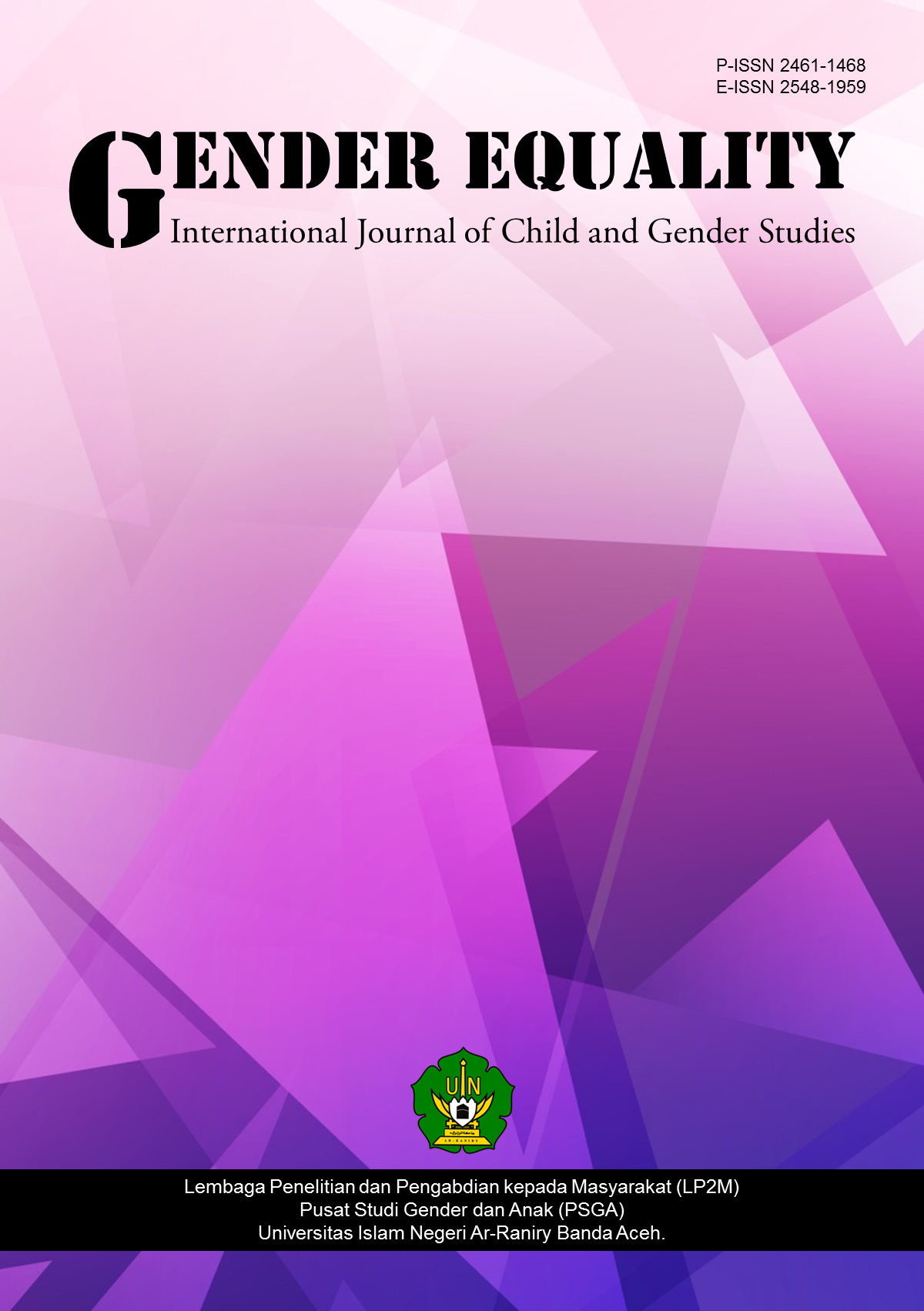PENGAWASAN ORANG TUA TERHADAP TONTONAN TELEVISI DAN PENGARUHNYA TERHADAP KEDISIPLINAN ANAK
DOI:
https://doi.org/10.22373/equality.v6i1.6508Keywords:
Pengawasan orang tua, Tontonan Televisi, Kedisiplinan AnakAbstract
Television broadcasts that are not in accordance with Islamic teachings, make children can watch whenever and wherever the broadcasts are. Therefore parents are needed supervision to select every television program watched by children. The problem in this study is parental supervision of television viewing and child discipline, as well as the efforts made by parents in increasing supervision of television viewing and child discipline, the constraints that become the population In this study are children aged 6-14 years, a total of 102 children and a sample of 30 children (30%). The methodology used in this study is field research. Data collection techniques used were observation, interviews, questionnaires and documents. The results showed that parental supervision of children's television viewing was not optimal. Obstacles faced by parents in supervising television viewing and child discipline are busy parents who work outside the home, lack of parental knowledge and parental indifference to television viewing supervision. Parents do not make any effort When children watch television that is violent/pornographic, but only a few who turn off the television and explain that these conditions are not good.
References
Arikunto, Suharsimi. (1990) Manajemen Pengajaran Secara Manusiawi, Jakarta, Rineka Cita.
Daradjat, Zakiah. (1990). Pendidikan Agama dalam Pembinaan Mental, Jakarta, Bulan Bintang.
Daulay, Haidar Putra. (2004). Pendidikan Islam dan Sistem Pendidikan Nasional di Indonesia, Jakarta, Kencana.
Djamarah, Syaiful Bahri. (2005). Guru dan Anak Didik dalam Interaksi Edukatif, Jakarta, Rineka Cipta.
Fatah, Nanang. (2004) Landasan Pendidikan Tinggi, Jakarta. Rineka Cipta.
Hadi, Sutrisno. (2000). Metodologi Reseach, Yogyakarta, Yayasan Penerbit UGM’
Hurlock, Elizabeth B.. (1997). Child Development, terj. Sulaiman Hanafiah Lembaga Bimbingan dan Penyuluhan FKIP, Darussalam FKIP Unsyiah.
Idris, S., & Tabrani ZA. (2017). Realitas Konsep Pendidikan Humanisme dalam Konteks Pendidikan Islam. Jurnal Edukasi: Jurnal Bimbingan Konseling, 3(1), 96–113. https://doi.org/10.22373/je.v3i1.1420
Idris, S., Tabrani ZA, & Sulaiman, F. (2018). Critical Education Paradigm in the Perspective of Islamic Education. Advanced Science Letters, 24(11), 8226–8230. https://doi.org/10.1166/asl.2018.12529
Lewis, M., & Ponzio, V. (2016). Character Education as the Primary Purpose of Schooling for the Future. Jurnal Ilmiah Peuradeun, 4(2), 137-146. doi:10.26811/peuradeun.v4i2.92
Manulung, M. (2009). Dasar-Dasar Manajemen, Cet. 21, Yogyakarta, Gajah Mada University Press.
Miarso, Yusuf Hadi. (2004) Menyemai Benih Teknologi Pendidikan, cet.4. Jakarta, Prenada Media Group.
Moleong, Lexy. (2006). Metodologi Penelitian Kualitatif, Bandung, Remaja Cipta Rosdakarya.
Mulyasa, E. (2005). Kurikulum Berbasis Kompetensi, Konsep Karakteristik dan Implementasi, Bandung, Remaja Rosdakarya.
Mursi, Syikh Muhammad Said. (2003). Seni Mendidik Anak, Jakarta, Pustaka Al-Kautsar.
Narbuko, Cholid dan Achmadi, Abu. (2004). Metodologi Penelitian, Jakarta, Bumi Aksara
Rivers, Williem I. (2004). Media Massa dan Masyarakat Modern, Cet. II, Jakarta, Prenada Media.
Salami, S. (2015). Implementing Neuro Linguistic Programming (NLP) in Changing Students’ Behavior: Research Done at Islamic Universities in Aceh. Jurnal Ilmiah Peuradeun, 3(2), 235-256.
Severe, Sal. (2002). Bagaimana Bersikap pada Anak agar Anak Bersikap Baik, Jakarta, Gramedia Pustaka Utama.
Sudiyono. (2004). Manajemen Pendidikan Tinggi, Jakarta, RinekaCipta.
Sulistyowati, Sofchah. (2001). Cara Belajar yang Efektif dan Efesien, Pekalongan, Cinta Ilmu Pekalongan.
Tabrani ZA, & Masbur. (2016). Islamic Perspectives on the Existence of Soul and Its Influence in Human Learning (A Philosophical Analysis of the Classical and Modern Learning Theories). JURNAL EDUKASI: Jurnal Bimbingan Konseling, 1(2), 99–112. Retrieved from http://jurnal.ar-raniry.ac.id/index.php/cobaBK/article/view/600
Tabrani ZA. (2009). Ilmu Pendidikan Islam (antara Tradisional dan Modern). Kuala Lumpur: Al-Jenderami Press.
Tabrani ZA. (2012). Future Life of Islamic Education in Indonesia. International Journal of Democracy, 18(2), 271–284.
Tabrani ZA. (2015). Persuit Epistemology of Islamic Studies (Buku 2 Arah Baru Metodologi Studi Islam). Yogyakarta: Penerbit Ombak.
Tafsir, Ahmad. (2004). Metodologi Pengajaran Agama Islam, Cet. 4. Bandung, Remaja Rosdakarya.
Wahyudin. (2007). Anak Kreatif, Jakarta, Gema Insani.
Walidin, W., Idris, S., & Tabrani ZA. (2015). Metodologi Penelitian Kualitatif & Grounded Theory. Banda Aceh: FTK Ar-Raniry Press.
Yulia, Anna. (2007). Working MOM dan Kids, Jakarta, Elex Media Komputindo.
Zuriah, Nurul. (2009). Metodologi Penelitian Sosial dan Pendidikan, Jakarta, Bumi Aksara.
Downloads
Published
Issue
Section
License
GENDER EQUALITY: International Journal of Child and Gender Studies allows the author(s) to hold the copyright and to retain the publishing rights without restrictions. Authors who publish with this journal agree to the following terms:
- Authors retain copyright and grant the journal right of first publication with the work simultaneously licensed under a Creative Commons Attribution License that allows others to share the work with an acknowledgment of the work's authorship and initial publication in this journal.
- Authors are able to enter into separate, additional contractual arrangements for the non-exclusive distribution of the journal's published version of the work (e.g., post it to an institutional repository or publish it in a book), with an acknowledgment of its initial publication in this journal.
- Authors are permitted and encouraged to post their work online (e.g., in institutional repositories or on their website) prior to and during the submission process, as it can lead to productive exchanges, as well as earlier and greater citation of published work.



